The landscape of property developments in South Africa for 2025 is set to be marked by a blend of innovative residential projects and commercial buildings, encompassing multiple regions and addressing the modern demands of the population. This period of growth will see a focus on sustainability, modern architecture, and smart technology, promising to enhance urban living while presenting strategic investment opportunities.
Given the economic challenges and market dynamics, average real estate prices are not expected to rise significantly in 20251. However, various factors such as urbanization trends, infrastructure development, and post-pandemic tourism recovery could potentially drive property price increases1. The government’s commitment to affordable housing initiatives and extensive infrastructure projects further contributes to the evolving property market climate2.
Specific property types like tech-equipped apartments, family-sized suburban homes, and eco-friendly buildings with low carbon footprints are anticipated to witness heightened demand and appreciation1. Cape Town, for instance, is seeing a surge in sustainable and energy-efficient properties, reflecting the broader trend in South Africa2.
Key Takeaways
- Property developments in South Africa for 2025 will feature a blend of residential projects and commercial buildings.
- Economic challenges suggest modest real estate price increases, influenced by urbanization and infrastructure development12.
- Government initiatives for affordable housing play a crucial role in the property market2.
- High-growth areas and eco-friendly buildings are anticipated to see an increase in demand1.
- Cape Town leads in sustainable and energy-efficient property developments2.
Overview of Current Real Estate Trends in South Africa
South Africa’s real estate market presents a dynamic landscape characterized by varied regional performances and economic indicators that influence market sentiment. Real estate investments in this region are experiencing unique challenges due to economic fluctuations and changing urban planning policies. These factors collectively shape the metropolitan growth in different provinces.
Market Sentiment and Economic Indicators
The South Africa Residential Real Estate Market was sized at USD 18.01 billion in 2023, expected to grow to USD 19.89 billion in 2024 and further to USD 32.71 billion by 2029, showcasing a CAGR of 10.46% during 2024-20293. Despite an overarching skepticism, the market sentiment remains cautiously optimistic as highlighted by major industry players like Pam Golding Properties and Renprop (Pty) Ltd3. Economic challenges such as inflation and political instability are impediments, yet urbanization and government initiatives suggest possible localized market uplift, especially as the tourism sector recovers post-pandemic.
Regional Real Estate Performance
Regional performances in South Africa reveal insightful distinctions. Cape Town and Johannesburg, as major metropolitan areas, maintain housing prices that exceed one million South African rand3. Residential properties in Gauteng are valued at R2.558 trillion, whereas Western Cape properties total R2.014 trillion, highlighting significant economic contributions from these provinces4. Additionally, Mpumalanga recorded the highest growth in rents, indicating a robust demand in rental markets3. Notably, 66% of residential properties across the country are valued under R900,000, with government-subsidized housing comprising a substantial 43% when accounting for units in the title deed backlog4.
Notable Property Developments in Major South African Cities
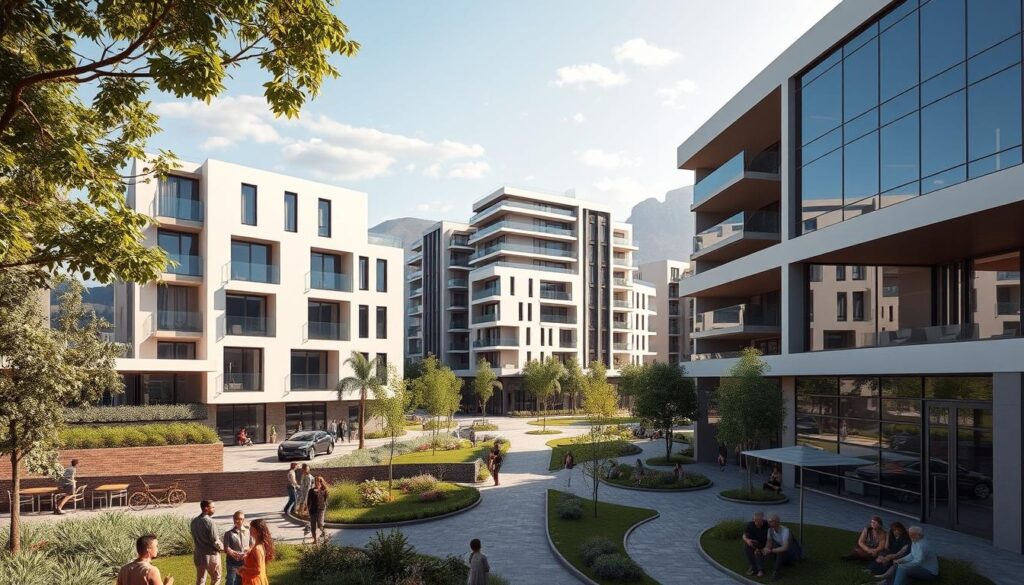
South Africa’s major cities, including Cape Town, Johannesburg, and Durban, are undergoing significant transformations with numerous residential projects, commercial buildings, and urban planning initiatives.
Key Projects in Cape Town
Cape Town has seen a considerable rise in prime property prices, reaching USD 5,600 per m2 in the most expensive suburbs5. This increase reflects the city’s appeal, coupled with low buy-in costs compared to international cities like New York and London, where USD 1 million buys around 178 m2 versus just 26 m2 and 29 m2 respectively5. This city is focused on urban renewal projects, especially in areas like Woodstock, a hub for creative endeavors and modern residential projects.
New Buildings in Johannesburg
Johannesburg, specifically the Sandton area, is witnessing the development of high-value, luxury residential projects. The Waterfall City in Midrand, Gauteng, stands out with an estimated developed value of R100 billion6. This development plans to combine 28,000 residential units and around 1.6 million square meters of commercial buildings accommodating 80,000 people each6. Waterfall City also features significant contributions to the employment sector, aiming to create close to 85,000 job opportunities6. Key players like Balwin Properties and Attacq are pivotal, with plans to complete approximately 23,000 residential units and further commercial infrastructures, respectively6.
Upcoming Developments in Durban
Durban is another focal point for urban planning and development. The city is seeing new commercial buildings aimed at upgrading its economic status. With plans for rejuvenation and expansion, Durban endeavors to enhance its urban environment and attract investment. Key contributors include infrastructure projects that promise to boost not only the local economy but also attract residential projects that align with modern urban living standards.
The property landscape across these cities showcases a robust blend of residential projects, commercial buildings, and comprehensive urban planning, signaling a prosperous future for South Africa’s property market.
Impact of Urbanization on Property Prices
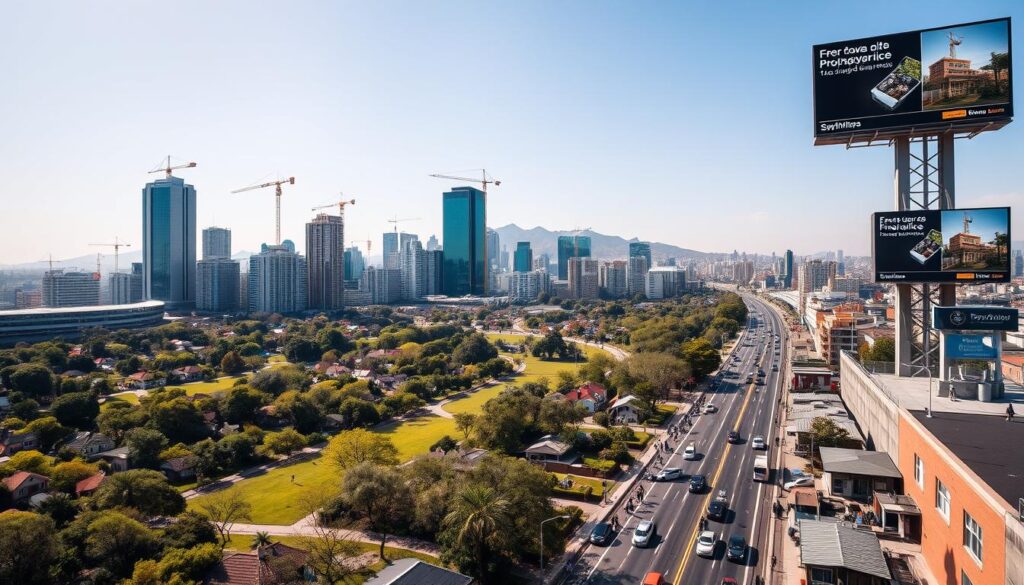
The relentless urbanization in South Africa is a driving force affecting property prices, with a significant inflow of populations into major cities like Johannesburg and Cape Town, fostering a high demand for housing. By 2050, it is projected that 65% of the population will reside in urban areas, exacerbating the housing demand and influencing property price impact7.
Urban areas are seeing a surge in migration trends, which in turn is leading to increased housing demand. This phenomenon is coupled with the fact that approximately 13.5% of households reside in informal dwellings, indicating a significant need for formal housing solutions7. Additionally, South Africa’s real estate market experiences ‘semigration,’ where individuals move from larger cities to smaller towns for better living conditions and affordability due to the impact of hybrid working models8.
Urban Development Projects
To accommodate the growing urban populations, several urban development projects are underway. Government infrastructure projects designed to enhance connectivity are predicted to positively impact property values9. For instance, emerging markets and sectors within rapidly urbanizing areas provide promising opportunities for investors, particularly in affordable housing and sustainable developments8.
Noteworthy are the advancements in technology and sustainability driving innovations in property development. These include smart homes, energy-efficient systems, and eco-friendly features becoming more common in new developments9. Despite these strides, around 30% of municipalities still struggle to provide basic services like water and sanitation, highlighting ongoing challenges in urban development7.
This surge in urbanization, coupled with ongoing development projects, is shaping the housing market trends in South Africa. The resulting urbanization effects are not only redefining city landscapes but also significantly influencing the property price impact across the country. The growing demand for modern residential spaces is set to rise, driven by population growth and urban migration9.
Government Initiatives and Infrastructure Development
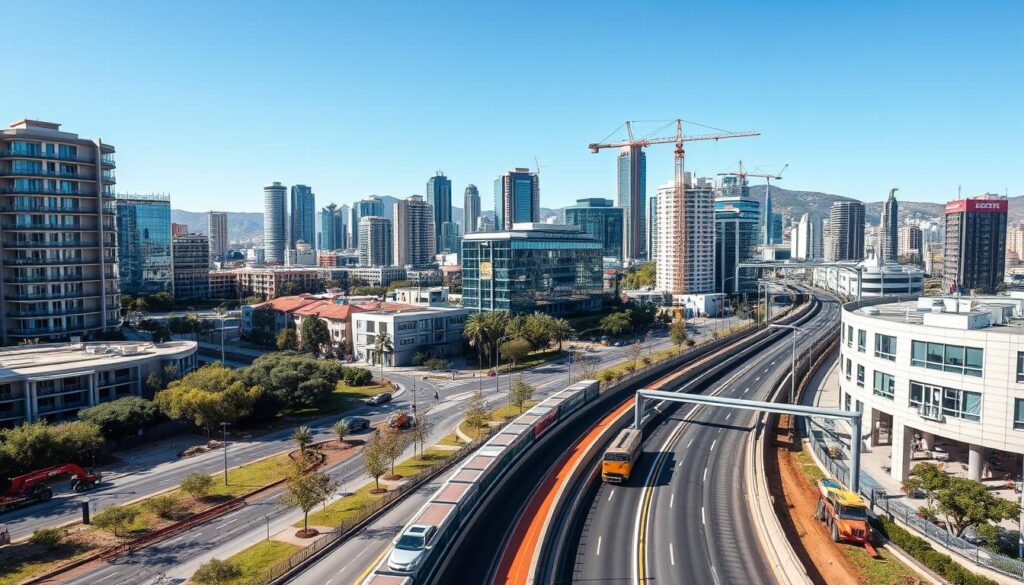
In South Africa, government initiatives play a pivotal role in the property sector, notably through substantial infrastructure development efforts aimed at promoting economic growth and affordable housing. One prominent initiative is the Expanded Public Works Programme (EPWP), which provides employment and training to unemployed individuals across various sectors such as infrastructure, environment, culture, and social and economic spheres10.
Further strengthening these efforts, the EPWP includes specialized programs like the Contractor Learnership Programme (Vuku’phile) and the National Youth Service (NYS) Programme aimed at youth in the Built Environment10. Additionally, the Contractor Incubation Programme (CIP) aids contracting enterprises, specifically those within categories 3 to 7 of the Construction Industry Development Board (CIDB) grading10.
The Municipal Infrastructure Grant (MIG) complements these initiatives by supporting municipalities in providing basic services to underprivileged communities. This includes developing residential infrastructure, municipal services, and public facilities10. Furthermore, the National Urban Reconstruction and Housing Agency (NURCHA) facilitates bridging finance for housing projects, supporting contractors in their endeavors10.
The South African government also strongly supports the Local Economic Development (LED) initiative, which fosters sustainable economic growth through collaborative efforts between government, business, and communities in every municipality10. Moreover, the success of the Gautrain Rapid Rail Link and the Renewable Energy Independent Power Producer Procurement Programme (REIPPPP) exemplifies the potential of public-private partnership (PPP) models to address infrastructure gaps effectively11.
PPP projects not only boost job creation across various sectors such as construction, engineering, and management, but also accelerate project completion and improve quality by leveraging private sector expertise11. These projects Stimulate local economies by procuring goods and services from nearby suppliers, contributing significantly to economic growth in surrounding areas11.
Additionally, sustainable infrastructure development through PPPs is crucial for South Africa, allowing the country to meet environmental standards and reduce its carbon footprint. This is particularly important given that around 70% of global greenhouse gas emissions stem from built environment and infrastructure projects11. Implementing eco-friendly technologies such as Computerised Maintenance Management Systems (CMMS) and IoT sensors in PPP projects can further enhance asset management and promote efficient energy use11.
Effective governance measures within PPP contracts improve transparency and accountability, ensuring that public funds are used efficiently and corruption risks are minimized11. The South African government can reinforce these efforts through clear reporting structures, bolstering transparency and public confidence in PPP projects11.
| Government Initiative | Key Focus Area | Impact |
|---|---|---|
| Expanded Public Works Programme (EPWP) | Employment, Training, Infrastructure Development | Provides job opportunities and skill development for unemployed individuals |
| Municipal Infrastructure Grant (MIG) | Municipal Services, Residential Infrastructure | Supports basic service provision to impoverished communities |
| National Urban Reconstruction and Housing Agency (NURCHA) | Housing Project Financing | Offers bridging finance for housing projects, aiding contractors |
| Local Economic Development (LED) | Sustainable Economic Growth | Drives economic growth through government, business, and community partnerships |
| Gautrain Rapid Rail Link | Public-Private Partnership (PPP) | Successful PPP model, boosts local economies and job creation |
| Renewable Energy Independent Power Producer Procurement Programme (REIPPPP) | PPP, Renewable Energy | Promotes sustainable energy projects and environmental standards |
Sustainable Construction and Eco-Friendly Building Practices
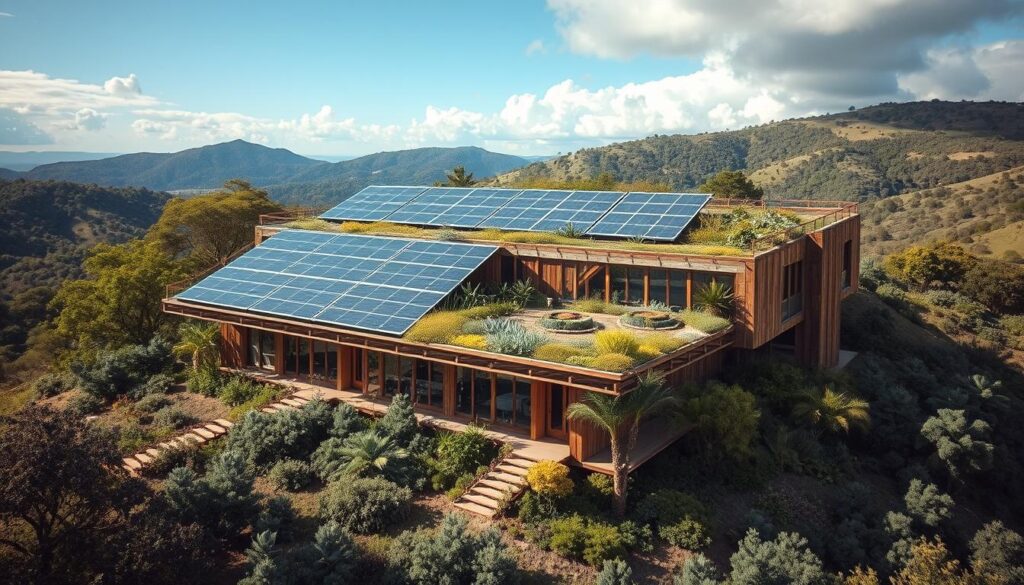
South Africa’s commitment to sustainable construction is evident through its increasing adoption of eco-friendly building practices. The integration of biophilic design is particularly noteworthy, creating structures that harmonize with natural elements to promote both environmental sustainability and enhanced living conditions.
Introduction to Biophilic Design
Biophilic design is central to sustainable construction, emphasizing the incorporation of natural elements into architecture. This approach not only provides aesthetic and environmental benefits but also improves occupants’ well-being. By integrating nature within urban spaces, biophilic design helps create eco-friendly buildings that are both energy-efficient and visually appealing.
Case Study: The Fynbos Project
The Fynbos Project in Cape Town exemplifies the successful application of biophilic design. This pioneering project incorporates native plant species into its urban architecture, enhancing the natural landscape and promoting biodiversity. Furthermore, advanced sustainable construction techniques, such as the use of reclaimed wood and bamboo, are employed to minimize the carbon footprint12. As a result, more residential properties in South Africa are now incorporating green technologies like solar panels and smart home systems12.
Tools and Technologies in Sustainable Building
Advanced tools and technologies are instrumental in the development of sustainable construction projects. For example, the use of precast concrete enhances project sustainability by reducing on-site construction times and minimizing carbon emissions13. Additionally, straw bales and bamboo are utilized for their exceptional insulation properties and renewable nature, further contributing to eco-friendly building practices13. Moreover, government incentives have led to a significant increase in homeowners benefiting from subsidies for sustainable upgrades12.
Organizations are also investing in resources to support eco-friendly construction as they recognize the importance of environmental, social, and governance (ESG) initiatives. The Green Building Council of South Africa continues to play a crucial role by setting standards and certifications like The Green Star and LEED, ensuring that buildings meet stringent sustainability criteria14.
To learn more about the growing market for sustainable construction and the innovative technologies employed, you can refer to the country commercial guide for South Africa’s green building.
Property Developments South Africa
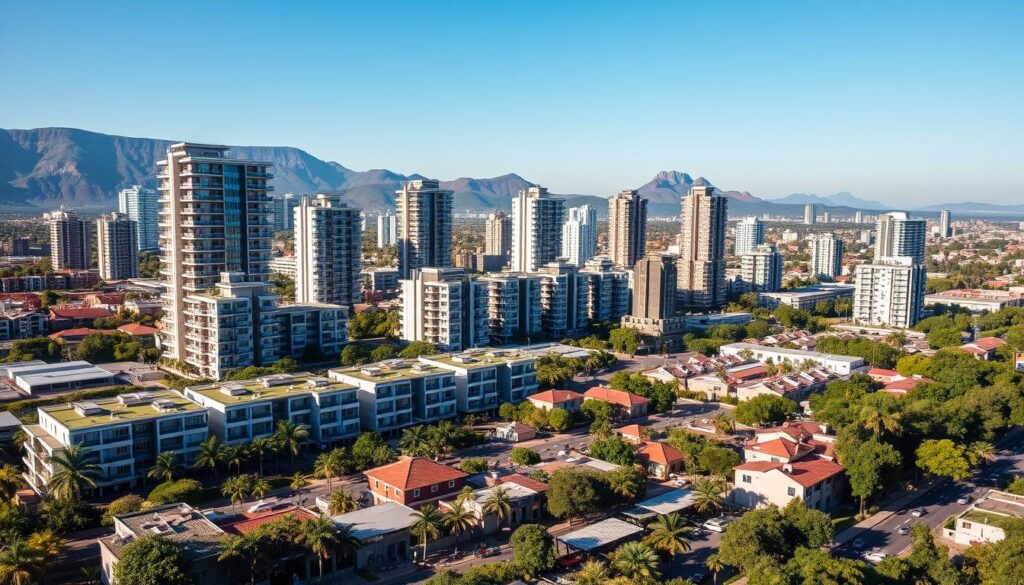
South Africa’s property developments landscape in 2025 is characterized by a diverse range of residential and commercial projects designed to cater to various needs and budgets. From luxury residential projects to expansive commercial buildings, each development aims to enhance the urban experience while fostering economic growth. Below are some of the most noteworthy developments to watch.
Residential Projects to Watch
Among the notable residential projects is Serenity Hills in Kwa-Zulu Natal, offering eco-friendly living with prices starting at R1,395,000. This development comprises 600 units designed to meet modern living standards15. Similarly, Johannesburg’s bustling Country Garden Estate features units ranging from R999,000 to R1,650,000 across 403 units, catering to various budget preferences15.
Luxury seekers may find Hyde on First in Sandton appealing, with units priced between R7,900,000 and R8,900,000, though only 16 units are available, ensuring exclusivity15. Similarly, HQ Sandton offers 778 apartments with prices beginning at R890,000 and extending up to R2,880,000, attracting a broad spectrum of buyers15.
Commercial Infrastructure Developments
Commercial buildings are also a focal point of South Africa’s property market in 2025. These developments aim to boost economic activities and support a growing workforce. Key projects include mixed-use facilities and office complexes strategically located in thriving urban centers like Sandton and Johannesburg.
One such standout development is the Steyn City Parkland Residence in Midrand, boasting an impressive 8,000 units priced from R2,500,000 to R18,000,000, offering a variety of options for both residential and commercial purposes15. Additionally, projects such as The Polofields in Midrand offer 1,512 units with prices starting at R2,199,900, blending high-end living with proximity to key commercial areas15.
For those interested in mixed-use properties, the Blue Hills Equestrian Estate offers 128 units priced between R2,800,000 and R37,000,000, combining luxury living with equestrian amenities and commercial spaces15. This development is strategically positioned to cater to affluent buyers seeking a blend of urban convenience and country charms15.
For more detailed insights on the extensive variety of property developments in South Africa, visit this link15. These burgeoning developments are set to reshape the property market, offering promising opportunities for investment and personal residence.
Real Estate Investment Opportunities in 2025
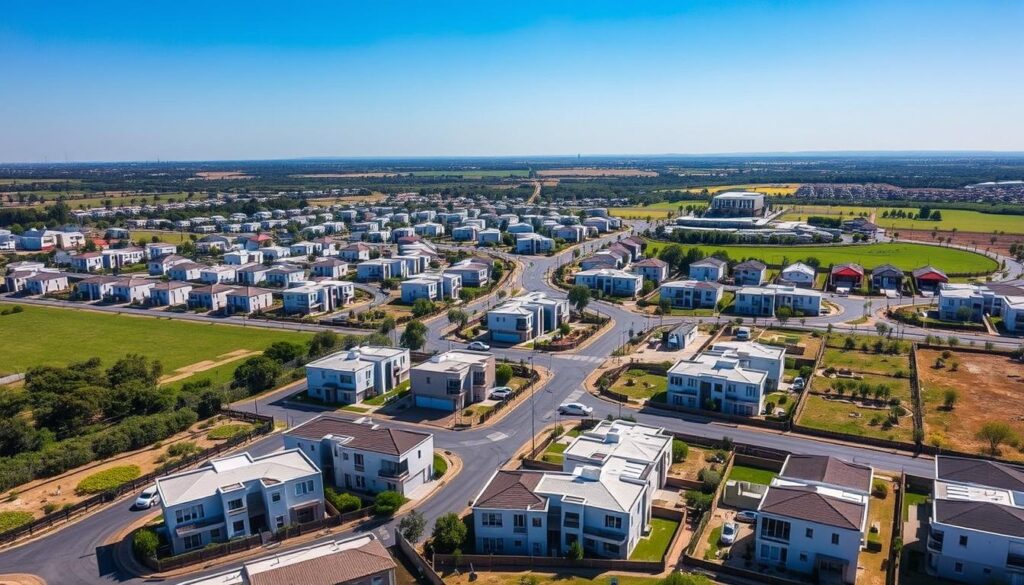
Investors looking at real estate investments in South Africa are encouraged by a variety of high-growth investment areas and the potential for substantial property appreciation. Coastal suburbs like Camps Bay and Clifton in Cape Town, as well as Maboneng Precinct in Johannesburg, are particularly noteworthy for their investment potential. These high-demand locations offer a mix of luxurious lifestyle amenities, such as fitness centers and coworking spaces, thereby making them attractive to both local and international buyers16.
High-Growth Areas for Investment
Significant growth has been observed in coastal areas such as Umhlanga and Ballito in Durban and Menlyn and Waterkloof in Pretoria. These regions offer diverse investment opportunities due to their appealing infrastructure and economic trends17. Besides, secondary cities like Port Elizabeth and Bloemfontein stand out as emerging investment hotspots, attracting attention due to their robust market foundations and potential for high returns17. Additionally, Johannesburg’s housing market caters to a variety of budgets and displays strong rental demand, further enhancing its attractiveness as an investment destination17.
Types of Properties with High Appreciation Potential
Various property types in South Africa exhibit high appreciation potential. Mid-tier housing has seen increased demand, reflecting a significant shift in buyer demographics and the economic landscape16. In Cape Town and Johannesburg, there is also a high demand for premium properties, particularly those with energy-efficient solutions like solar power and lifestyle amenities16. Furthermore, sectional title properties have gained popularity, comprising 29% of residential sales by 2024, compared to 13.6% in 200018. This surge can be attributed to the enhanced market accessibility afforded by online property management systems and appealing lending rates16.
National house prices reflected a general property appreciation trend, rising by 4.9% in September 2024 and averaging a 3.5% inflation rate over the year18. Additionally, first-time buyer volumes are on the rebound as interest rates decline and inflation subsides18. For investors, properties in rapidly developing regions offer substantial potential for long-term appreciation, making them wise additions to any diversified investment portfolio16.
| Region | Investment Highlights |
|---|---|
| Cape Town | Coastal suburbs like Camps Bay and Clifton, premium market |
| Johannesburg | Maboneng Precinct, strong rental demand |
| Durban | Umhlanga, Ballito |
| Pretoria | Menlyn, Waterkloof |
| Port Elizabeth | Emerging investment hotspot |
| Bloemfontein | Secondary city with high returns potential |
Housing Market Trends: Predictions for 2025
The South African housing market in 2025 is set to be shaped by numerous factors, including economic stability, governmental policies, and buyer sentiment. The dynamics of the market are influenced by various drivers that create both opportunities and challenges for different stakeholders.
Factors Driving Market Dynamics
One of the key factors affecting the housing market trends is the direction of interest rates. The Federal Reserve’s pivot to reducing interest rates signals a peak in inflation and construction costs, which can affect net operating income growth and indicate a slower economy19. Moreover, modernized building stock and supply dynamics are critical considerations for investors as emerging real estate cycles present growing opportunities19.
Government policies, such as those aimed at improving infrastructure and promoting affordable housing, also play a significant role in shaping market dynamics. National house price inflation rose to +4.7% in July 2024 from +2.4% in Q3 202320, highlighting the impact of these policies. Additionally, predictions suggest gradual reductions in the repo rate can lead to increased buyer pools and opportunities for existing homeowners21.
Expected Price Movements
Price predictions for the South African housing market show a diverse landscape. Urban areas, particularly those with significant infrastructure development, are expected to see upward price movements. For instance, Cape Town experienced the strongest growth in 2024 at +2.9%, indicating a recovery in major metro markets20. Conversely, emerging regions like Gauteng and KZN may offer value home purchases, especially as interest rates decrease and buyer demand rises21.
Luxury property sales have demonstrated remarkable strength, with significant stock shortages driving up prices20. Meanwhile, the national applications for first-time buyers rose to 46.6% in July 2024, a rebound from 44.3% in June20. These trends reflect the diverse price movements across different segments of the market.
The housing market trends in 2025 also show significant regional variations. Foreign investments remain a notable factor, particularly in the Western Cape, where 14 of the 15 towns experiencing an influx of new homeowners from other areas are located21. This influx can lead to steady returns in this region, while policymakers’ decisions and emerging trends will continue to drive market dynamics and influence price predictions across the country.
For more insights into these trends and detailed predictions, you can visit the comprehensive report on 2025 South African property market predictions on Private Property21.
Areas in South Africa with the Most Promising Growth
South Africa’s real estate market is experiencing a notable shift, especially in areas showing promising growth. Investors are keenly eyeing these real estate hotspots, and the trend is set to continue well into 2025. Here is an overview of some of the most prominent emerging neighborhoods and growth hotspots across Cape Town, Johannesburg, and Durban.
Emerging Neighborhoods in Cape Town
The city of Cape Town is renowned for its diverse and trendy areas, making it a prime destination for real estate investment. Notable neighborhoods include Woodstock and Green Point, which have gained significant attention due to their artsy vibes and proximity to the central business district. Additionally, areas like City Bowl (Gardens, Oranjezicht, Tamboerskloof) and De Waterkant are attracting creative crowds and young professionals22. The coastal areas of Muizenberg, Kalk Bay, and Simon’s Town are also popular investment choices for holidaymakers22.
Moreover, the Western Cape is experiencing semi-migration, particularly in towns like Hermanus, Onrus, and Langebaan, which are now prime investment targets due to their coastal charm and booming property market23.
Growth Hotspots in Johannesburg
Johannesburg remains a pivotal city for property investors, with several areas showing promising growth. Neighborhoods such as Maboneng are undergoing revitalization, attracting a mix of artists, entrepreneurs, and young families looking for affordable yet vibrant living options. Nearby areas with a lower average asking price, such as Ferndale, Northwold, and Winchester Hills, provide excellent opportunities for investment while offering comfortable living and convenient access to various facilities23. These affordable suburbs are popular with property investors due to their strategic location and growth potential23.
Up-and-Coming Areas in Durban
Durban’s real estate market is no exception when it comes to promising growth areas. Emerging neighborhoods include regions close to new commercial developments and those offering a mix of residential and investment opportunities. Suburbs such as Reservoir Hills, North Beach, and Avoca present excellent potential, aligning with the average purchase price of properties in South Africa at R1,407,07123. Additionally, areas like Ballito in Kwazulu Natal are attracting attention for their quiet coastal living paired with close proximity to Durban, making them preferred choices for investors and families alike23.
Property Finance Options in South Africa
The South African property market offers diverse property finance options designed to cater to various needs of property buyers. From traditional mortgage financing to government-supported housing loans and innovative alternative financing solutions, potential homeowners have several avenues to secure funds for their dream properties.
Traditional Mortgage Financing
Traditional mortgage financing remains one of the most popular property finance options in South Africa. Leading home loan comparison services like ooba Home Loans help clients compare deals from multiple banks, increasing the chances of obtaining favorable mortgage terms. Such services provide valuable tools like bond calculators to determine affordability and streamline the home loan application process24
.
Government-Supported Housing Loans
For individuals who may not qualify for conventional mortgage financing, the government offers various housing loans. Public programs like the Trust for Urban Housing Finance (TUHF) facilitate the purchase and development of properties, especially in inner-city areas24. These loans come with flexible terms and cater to both acquisition and construction needs, applying interest rates linked to prime or JIBAR25.
Alternative Financing Solutions
In addition to traditional and government-backed loans, there are innovative alternative financing solutions available for property buyers. One example is leveraging home equity to secure another loan for investment properties24. Other solutions, such as partnerships and private loans, offer flexible terms tailored to specific project needs creative financing options24.
Moreover, TUHF extends its support to property entrepreneurs through various programs, including customized training and mentoring. These initiatives empower individuals to convert underutilized buildings into affordable rental housing, contributing to urban regeneration25. By providing short-term bridging finance, TUHF ensures quick decision-making for purchasing properties, and supports diversification of property ownership through the Intuthuko Equity Fund26.
Consumer Behavior and Changing Preferences
In recent years, shifts in consumer behavior have been significantly impacting the South African property market. Understanding these changes is crucial for stakeholders aiming to navigate the evolving landscape.
Trends in Homebuyer Demographics
Current homebuyer trends reveal a diverse demographic seeking new properties. The rise of digital connectivity means that a significant portion of South Africans begin their shopping journey online, with statistics showing that 74% explore product options on the internet before making a decision27. Notably, 40% of these consumers ultimately finalize their purchases online, though a sizeable 42% prefer to conduct their transactions in-store after initial online discovery27.
Young professionals are increasingly investing in residential properties that cater to lifestyle preferences aligned with convenience and security. The use of mobile wallets and contactless payments has grown due to their convenience and the adoption of new technologies28. Studies also indicate that social media and branded emails significantly influence purchasing decisions, impacting 41% and 30% of consumers respectively27.
Shift Towards Sectional Title and Estate Living
There is a noticeable shift towards sectional title properties and estate living, driven by a preference for secure, community-oriented spaces within urban environments. This lifestyle preference is also evident in the rise of “click and collect” models, which 37% of South Africans opt for, blending online convenience with in-person acquisition27. The demand for energy-efficient and eco-friendly homes also aligns with broader sustainability measures being prioritized by new developments.
The recovery of foot traffic in shopping centers post-COVID has brought back a consistent preference for in-person shopping experiences29. Innovative concepts like endless aisle and in-store kiosks allow consumers to explore a comprehensive online assortment while in-store, thus bridging the gap between digital and physical shopping environments29. Additionally, the incorporation of AR and VR technologies is enhancing the consumer journey, providing immersive experiences29.
Collectively, these trends reflect a dynamic interplay of digital innovation and traditional preferences, guiding homebuyer decisions and shaping the future of real estate in South Africa.
Conclusion
The property developments review of South Africa in 2025 illuminates a dynamic and ever-evolving market driven by various economic, socio-political, and environmental influences. With a growing urban population and significant government intervention through infrastructure projects, the real estate landscape is poised for substantial expansion. These strategic insights, coupled with emerging investment opportunities, provide a market outlook that is both promising and transformative.
Noteworthy is the burden of rotational load shedding, with outages culminating in 289 days in 2023, underscoring the need for reliable infrastructure to support these developments30. While the unemployment rate remains a challenge, with Q2-2024 figures standing at 33.5%, actual jobs added in 2023, totaling 790,000, suggest a gradual economic recovery30. Furthermore, the resilience of the residential property market, comprising 6.91 million properties valued at R6.789 trillion, reflects a significant growth area despite prevailing economic hardships4.
Significantly, over two-thirds of South African properties are valued at R900,000 or lower, presenting accessible options for a broad spectrum of buyers4. The ongoing rise in high-end property shares, particularly in Gauteng and Western Cape, further points to a diverse and vibrant market. As the nation embraces eco-friendly practices and sustainable construction methods, the real estate sector is aligned to meet both contemporary demands and future growth imperatives, ensuring a balanced and inclusive market outlook.
FAQ
What are the standout property developments in South Africa for 2025?
The landscape for 2025 showcases a mix of innovative residential and commercial projects with a focus on sustainability and modern architecture. Key developments include urban renewal projects in Woodstock, Cape Town, luxury residential developments in Sandton, Johannesburg, and new commercial infrastructures in Durban.
What current trends are impacting South Africa’s real estate market?
The market is influenced by a combination of economic indicators and regional performance, urbanization, government initiatives, and a post-pandemic tourism recovery. These factors might stimulate localized market segments despite challenges like political instability and economic stagnation.
Which cities are witnessing major property developments?
Major South African cities like Cape Town, Johannesburg, and Durban are seeing significant property developments. Cape Town’s Woodstock is undergoing urban renewal, Sandton in Johannesburg is hosting luxury residential projects, and Durban is focusing on new commercial infrastructures.
How does urbanization affect property prices in South Africa?
Urbanization results in a significant inflow of populations into major cities such as Johannesburg and Cape Town, creating high demand for housing and driving property prices upward. This trend is supported by numerous development projects aimed at accommodating the growing urban population.
What initiatives is the South African government undertaking to boost the property sector?
The government is implementing various initiatives to promote affordable housing and comprehensive infrastructure development, aiming to stimulate economic growth, address housing shortages, and enhance residents’ quality of life.
What sustainable construction practices are being adopted in South Africa?
South Africa is experiencing a rise in eco-friendly building practices, including biophilic design, as seen in The Fynbos Project in Cape Town. These practices integrate natural elements with urban architecture, employing advanced tools and technologies to ensure energy efficiency and environmental harmony.
What investment opportunities do property developments in South Africa offer?
The real estate market offers diverse investment opportunities, particularly in high-growth areas such as Cape Town’s Northern Suburbs and Johannesburg’s Maboneng Precinct. Investments in energy-efficient apartments and rapidly developing regions are particularly attractive for long-term appreciation potential.
What factors are expected to drive housing market trends in South Africa in 2025?
Economic stability, governmental policies, urban development, and infrastructure improvements are key factors influencing the housing market trends. Price movements might vary, with certain locales potentially seeing increases due to these factors.
Which areas in South Africa show the most promising growth?
Promising growth areas include revitalized neighborhoods like Woodstock and Green Point in Cape Town, the Maboneng Precinct in Johannesburg, and regions in Durban near new commercial developments.
What property finance options are available in South Africa?
Financing options include traditional mortgages, government-supported housing loans, and alternative financing solutions. These financial products cater to the diverse needs of property buyers, making the market accessible to a broader range of individuals.
How is consumer behavior changing in the South African property market?
Consumer behavior is evolving with a shift towards sectional title properties and estate living. This trend reflects a growing preference for secure, community-oriented living spaces within urban areas, appealing to a diverse range of buyers from young professionals to retirees.
Source Links
- https://theafricanvestor.com/blogs/news/south-africa-price-forecasts
- https://www.celsaproperties.com/news/looking-ahead-property-investment-strategies-for-2025/
- https://www.mordorintelligence.com/industry-reports/residential-real-estate-market-in-south-africa
- https://housingfinanceafrica.org/app/uploads/2024/07/V8-National-Property-Market-Report-2024-Final-b.pdf
- https://www.chaseveritt.co.za/news/south-african-cities-are-the-stars-of-african-luxury-real-estate/
- https://propertyawards.net/digital/r100bn-waterfall-in-midrand-named-worlds-best-mixed-use-development/
- https://jb-propertydev.co.za/challenges-in-south-african-property-development/
- https://www.ikonic.co.za/news/8-key-trends-affecting-the-south-africas-real-estate-landscape/
- https://jb-propertydev.co.za/2023-property-development-insights-south-africa/
- https://www.gov.za/issues/infrastructure-programmes
- https://www.workplacefundi.com/blog/south-africas-path-to-sustainable-infrastructure-through-ppps
- https://jb-propertydev.co.za/sustainable-affordable-housing-trends-sa/
- https://jb-propertydev.co.za/eco-friendly-construction-materials-south-africa/
- https://kimbogroup.co.za/sustainable-construction-practices-in-south-africa/
- https://www.wisemove.co.za/post/top-new-developments-in-south-africa
- https://www.property24.com/articles/the-future-of-south-african-real-estate-top-trends-for-buyers-and-investors/32441
- https://www.linkedin.com/pulse/exploring-south-africas-hottest-property-markets-2025-rsa-property-cufjf
- https://www.rei.co.za/blog-posts/south-africa-housing-market-outlook-2025-key-trends-and-insights
- https://www.pwc.com/us/en/industries/financial-services/asset-wealth-management/real-estate/emerging-trends-in-real-estate.html
- https://blog.pamgolding.co.za/positive-outlook-for-sas-housing-market/
- https://lifestyleandtech.co.za/smart-living/article/2024-11-11/property-trends-to-look-out-for-in-2025
- https://www.denis-dunn-investor-club.co.za/blog/best-areas-to-buy-property-in-cape-town-south-africa-2024
- https://www.ooba.co.za/resources/best-property-investment-south-africa/
- https://www.ooba.co.za/resources/property-finance/
- https://www.tuhf.co.za/products-and-services/
- https://www.tuhf.co.za/
- https://www.linkedin.com/pulse/unlocking-south-africas-home-retail-landscape-key-insights-glqmf
- https://smesouthafrica.co.za/adapting-to-changing-consumer-behaviors-tips-for-smes/
- https://jb-propertydev.co.za/future-of-mall-construction-in-south-africa/
- https://www.worldbank.org/en/country/southafrica/overview

